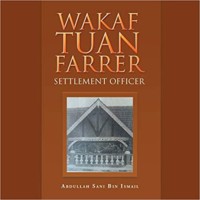Title: Wakaf Tuan Farrer: Settlement Officer
Author: Ismail Abdullah Sani Bin
Publisher: Partridge Singapore
ISBN: 978-1543756470
Pages: 144
Genre: History
Reviewed by: Tony Espinoza
Pacific Book Review
While the effort to elevate oneself in life through the cultivation of resources has always
been an underlying effort both individually and as a nation, one of the world’s most
powerful assets people try to attain is land itself. Whether it is acquiring land to add to a
nation’s power or acquiring land to build a home on, land is an important part of life. As
Plato once said, “Apply yourself both now and in the next life. Without effort, you cannot
be prosperous. Though the land be good, you cannot have an abundant crop without
cultivation.”
In author Ismail Abdullah Sani Bin’s Wakaf Tuan Farrer: Settlement Officer, he takes
readers into a very unknown portion of history; particularly during and after WWII, in the
Malaysian state of Kelantan. As a Settlement Officer, the author relays his experiences
of traversing the wild jungles of the state during the late 1940s and early 1950s, and
crafting local settlements to the point where they are today. He does so by relaying tales
as a child during the Japanese Occupation during WWII to becoming a Settlement
Officer, and the issues faced during the years on the job.
This is an interesting and powerful read. While one of the first things readers may notice
is that translation into English was not perfect which in my opinion adds to the
authenticity of the book. The overall history and culture imparted by the author and their
experiences as a settlement officer made this read all very worthwhile. The engaging
nature of the author’s experiences speak to the reader as they dive into this world, and
the experiences themselves showcase a profound difference in culture and
advancement as a people amongst different cultures, even within the nation of
Malaysia.
This was the perfect read for those who enjoy history-based memoirs and non-fiction
reads that take a hard look at various differences in culture and society. From the
horrors the author witnessed as a child during times of war, to experiences during the
years of being a settlement officer where villages would see tigers come in and steal
food from the markets at night, or even the way the people of Kelantan would interact
with the Jewish people as opposed to Christians and other beliefs, this book delves
profoundly deeply into the culture and history of this area.
Detailed and relatively quick to read, author Ismail Abdullah Sani Bin’s Wakaf Tuan
Farrer: Settlement Officer is a must-read historical memoir like no other. For those who
like to experience different cultures throughout history and see how modern-day
countries got to the point they are at now, this is the perfect read. The author engages
the reader on a personal level while relaying a lifetime of building settlements and
showcasing the culture of the area at the time.


